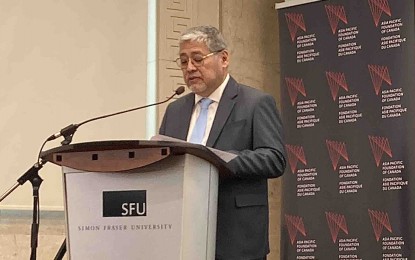
Foreign Affairs Secretary Enrique Manalo (Photo courtesy of DFA Assistant Secretary Jose Victor Chan-Gonzaga)
MANILA – The Philippines, located in a region home to some of the world’s dangerous flashpoints, is taking on a huge role to help shape a rules-based order with a foreign policy that promotes peace and adherence to international law.
Delivering a foreign policy speech at the Asia Pacific Foundation of Canada in Vancouver on May 7 (Pacific time), Foreign Affairs Secretary Enrique Manalo said Manila is one with like-minded nations in making the Indo-Pacific “an engine of global growth and a hub for human flourishing”.
“Especially in the midst of global uncertainties and the evolving geopolitical dynamics, we are dedicated as ever in playing our role in keeping our region on the path of peace and prosperity,” he said.
Manalo made the remarks amid China’s continuous intrusion and harassment within the Philippines' exclusive economic zone in the South China Sea.
He said the country would only use a “rules-based approach” in the management and resolution of disputes and overlapping claims in the area.
“To us, protecting our rights in our exclusive economic zone and ensuring unimpeded access is critical for safeguarding the livelihoods of our fisherfolk and preserving marine resources vital to our future,” he said.
“Far more than the noise of politics, it must be understood as an issue about our maritime identity, our people and our future."
Manalo said the South China Sea region is a small but vital part of the greater Indo-Pacific region, accounting for 12 percent of the world’s fish catch and some of the most precious ecosystems in the Coral Triangle.
More than 30 percent of all global maritime trade and about 40 percent of the world’s liquefied natural gas shipments also traverse the South China Sea.
In 2016, the Arbitral Tribunal issued a landmark decision and ruled that “there was no legal basis for China to claim historic rights to resources” beyond its maritime zones in the so-called nine-dash line.
“Now part of international law, it provides the moorings for a regime in the South China Sea that guarantees peace and prosperity for our nations and our citizens,” Manalo said.
President Ferdinand R. Marcos Jr. earlier said the Philippines would continue asserting its rights over the West Philippine Sea but would not replicate Beijing’s use of water cannon in its operations in the area.
He said the Philippines would not be the cause of increased tensions in the waters.
In April, Chinese Coast Guard vessels blasted the Philippine Coast Guard’s BRP Bagacay and Bureau of Fisheries and Aquatic Resources’ BRP Datu Bankaw with water cannons, damaging the vessels.
Meanwhile, Manalo said the Philippines is ready to chart a “new level of intentionality” in its partnership with Canada as he backed the latter's Indo-Pacific Strategy.
“The global currents demand a refocused vision and a new level of intentionality in charting the course of our partnership. The Philippines welcomes Canada’s Indo-Pacific Strategy as a decisive step towards Canada’s more deliberate engagement in the region, including with the Philippines,” he said.
To date, Manila seeks “greater synergy, sustainability and impact” in the Canada-Philippine cooperation, including on space, clean energy, climate action, defense, trade and maritime security.
Manalo is in Canada to discuss with his Canadian counterpart Foreign Minister Mélanie Joly on May 8 ways to "further advance shared priorities, including upholding regional peace and stability, promoting democracy and the rule of law, supporting long-term growth and prosperity, and combating climate change". (PNA)
